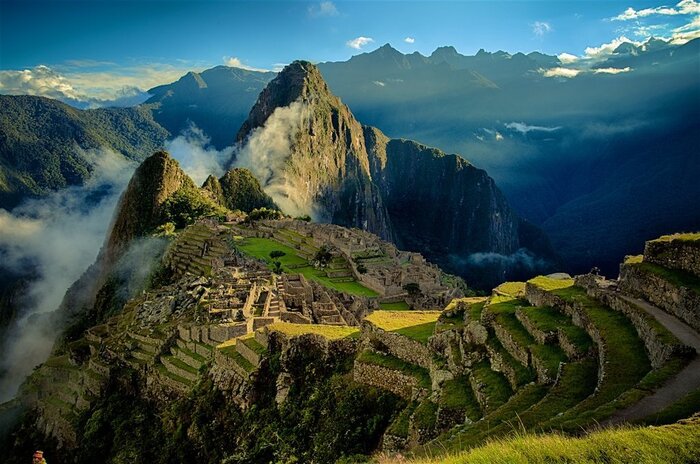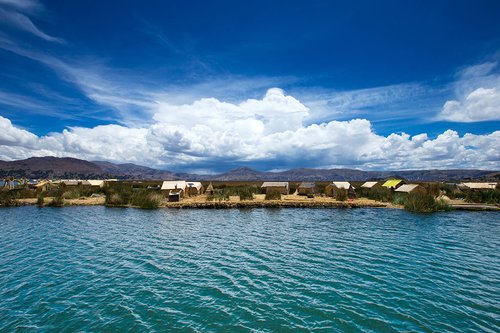Uros Floating Islands & Amantani Homestay, Lake Titicaca
Overview
Lake Titicaca straddles Peru and Bolivia at an elevation of 12,507 ft (3,812 m), making it the highest lake in the world that is navigable by large commercial vessels. The coastline outside of Puno is home to the Uros indigenous people, believed to be one of the first ethnic groups to populate the Andean region. They live on floating reed islands made from the totora plant, a thick buoyant reed. Totora is used to make everything from homes and boats to the islands, and is replaced frequently as the bottom of the island can rot in the water.
The Uros people offer guided tours to their homes and sell traditional handicrafts to supplement their traditional hunting and fishing economy.
Travelers can experience the traditions and culture with a 2-day guided trip, starting early in the morning sailing to the floating islands of Uros where they will spend time with the community and learn how they have been building their islands for centuries. Later they will continue to a larger, permanent island of Amantani where they will meet local residents who invited the travelers into their homes for lunch and a hike around the island. At night, they will join in the local celebration with the villagers before resting in a charming homestay.
After enjoying a simple, but tasty, local breakfast the next morning, the boat departs from Amantani towards Taquile Island. This is a beautiful Mediterranean-like island, where we'll be able to witness how the Taquileans have kept alive their traditions for centuries. Their colorful clothing and their unique knitted and woven textile handicrafts are spectacular to see. Following, we will have lunch in a local restaurant with amazing views of Titicaca Lake.
Finally, we'll walk down the stone stairs to the dock, from where we will board our boat back to Puno. We should be arriving at around at 15:30 to Puno.
For many, it can be a very special experience, although sometimes hard to communicate, as most villages do not speak English, with Quechua being their native language. English-speaking guides can help facilitate conversations.
Like what you see?
Chat with our local specialists and let us help you customize your trip with experiences like this.
Get startedLike what you see?
Chat with our local specialists and let us help you customize your trip with experiences like this.
Get startedItineraries with Uros Floating Islands & Amantani Homestay


Peru Highlights: Lima, Machu Picchu, Lake Titicaca, & Amazon Adventure - 15 Days
This 15-day itinerary starts in Lima before heading east to Puerto Maldonado, gateway to the Amazon Rainforest. Spend three days viewing wildlife while enjoying a comfortable...

Cusco, Short Inca Trail & Lake Titicaca - 9 Days
Explore the ancient Inca capital of Cusco, along with Machu Picchu, and the largest lake in South America on this 9-day exploration of local Peruvian culture. Start in...
Peru Experiences
Show more Peru experiences
Rainbow Mountain (Mount Vinicunca) Hike
It's a 3.5-hour drive from the city of Cusco to the trailhead leading up Vinicunca, known as the Rainbow Mountain. Also called the Montaña de los Siete Colors (Mountain of the...

Lake Titicaca Tour: Uros Floating Islands & Taquile Island
Lake Titicaca, the largest freshwater lake in South America, straddles the border between western Bolivia and southern Peru. All around are amazing locales and rich culture....

Private Machu Picchu Experience
Step back in time with a deep dive into Inca civilization as you explore the UNESCO-protected Machu Picchu and its ruins on a half-day, privately guided experience. After a...

A Taste of Cusco: Chocolate, Coffee and Pisco Tour
This tour in and around Cusco's city center highlights three Peruvian specialties: chocolate, coffee, and pisco. The tour begins at the Coffee Museum where visitors will learn...

Nazca Lines & Huacachina Adventure
This day excursion includes an aerial tour of the famous and mythic Nazca Lines of the southern Peruvian desert. The lines are a series of about 300 giant Pre-Columbian...
Best of Southern Peru
Best of Southern Peru
Best Places To Visit in Southern Peru
Southern Peru has a long list of both natural and man-made wonders. Come for Machu Picchu, but depart with the memories of the beautiful places scattered across the high,...


Colca Canyon Trek - 7 Days
For people who enjoy backpacking in the mountains and beautiful hot springs, this is the ideal multi-day trek. You'll have a local guide who will help you discover Colca Canyon,...


Classic Southern Peru - 15 Days
Experience the ultimate introduction to Peru in just over two weeks with this active itinerary that includes options for both hiking and biking. From Inca ruins to quaint...


Colca Canyon & Lares Trek Adventure - 13 Days
Discover Colca Canyon - one of the deepest canyons in the world. Here, you'll find a canyon filled with rivers, verdant forests, and an ancient agricultural tradition. During...


Arequipa, Colca Canyon & Lima- 11 Days
From the hustle and bustle of Lima to Peru's dramatic coast, this tour of Peru's south and Pacific seaboard is perfect for travelers with a thirst for adventure. Explore the...
Trip Planning Essentials

How kimkim Trips Work in Peru
Peru is a fascinating and complex country, full of ancient ruins and monuments, pulsing cities, and natural wonders—not to mention warm and welcoming people eager to share their...

Peru Travel Agents
Kimkim has selected the best Peru travel agents so you'll have a worry-free trip




